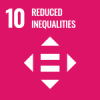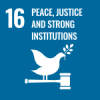The Center for Pancasila Studies (PSP) UGM once again held a discussion entitled “Discussing Pancasila” on Friday (7/2). The discussion this time had the theme “Disability & Inclusion-Based Sustainable Development”. As a speaker, PSP UGM invited Nuning Suryatiningsih from the Center for Improving Qualified Activity of People With Disabilities (CIQAL).
Nuning started the discussion by explaining about disabilities. According to her, disability is the result of interaction between people with limited abilities, attitudes, and the environment that hinders their participation in society on an equal basis with others.
“So, disability is not seen from a medical perspective, but from a social relationship perspective. Therefore, we call it a disability, not an impairment. Impairment is a medical term, “he explained.
Nuning explained that in relation to inclusiveness, the concept seeks to accommodate differences and values of diversity, one of which is disability. Therefore, she explained that inclusive developers aim to embrace differences and diversity in society.
According to Nuning, in order for this goal to be realized, vulnerable groups, including people with disabilities, are involved in the development process and policy formation. Such development policies or programs need to consider and be based on an assessment of the impacts on the lives of vulnerable groups.
“The involvement of vulnerable groups in the policy development process is important because with it, we can understand what they need in order to access a building, especially one that is designed for the public. That is so that there is no discrimination as to who can access the building,” she explained.
Thus, inclusive development must consider several principles, namely participation, non-discrimination, and accessibility. “So far, we, including myself, have encountered a lot of buildings claiming to be inclusive, only fulfilling the non-discriminatory principle, but forgetting the principle of accessibility,” she said.
Apart from the above principles, Nuning stated that inclusive development also needs to be based on a double track approach. The first path is action to mainstream vulnerable groups in all programs with a focus on removing various barriers to participation in society. The second path is the implementation of special treatment for vulnerable groups to enable them to participate and benefit from the program on an equal basis with others.
Nuning emphasized that applying the three principles as well as the two pathway approaches is the key to inclusive development. “With this, we can realize equal rights and opportunities for all people, including vulnerable groups within it,” she said.
Agus Wahyudi, Ph.D., head of PSP UGM, agreed with Nuning’s explanation about inclusive development. According to him, the Indonesian state with its fifth principle of Pancasila seeks to accommodate social justice for all its people. Consequently, this country must also make no one feel left behind in the fulfilling their rights.
“This inclusive development is a reflection of the duties and roles of the state that should be carried out in society. This concept is a reflection of a good and fulfilling life together from the community,” he concluded.
Source: https://ugm.ac.id/id/berita/19005-pembangunan-inklusif-bagi-masyarakat-indonesia-yang-beragam



